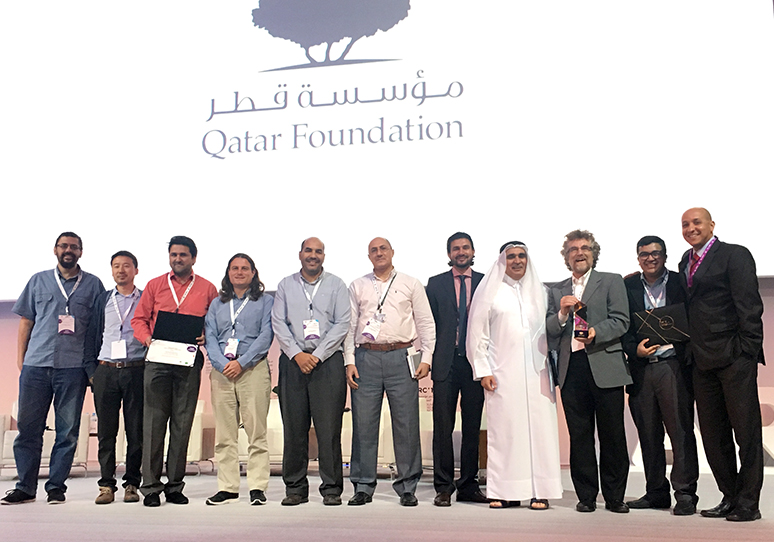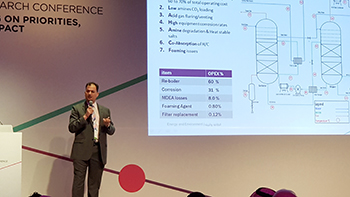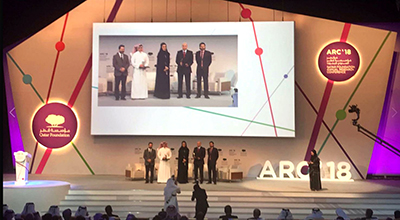
Qatar Computing Research Institute: Everyday Solutions for Global Challenges
An automated transcription and translation system developed by Qatar Computing Research Institute, part of Hamad Bin Khalifa University, has been awarded the Qatar Foundation Annual Research Conference 2018 Best Innovation Award.
QCRI’s Advanced Transcription System (QATS) automatically converts speech to text using state-of-art speech recognition techniques. QATS provides the ability to transcribe Arabic and translate into English, and vice versa.
The speech transcription has been used by Aljazeera.net for automatic generation of subtitles in video segments for more than three years, and discussions are underway with other potential users. QATS speech recognition system has achieved an accuracy rate of 93 percent for broadcast news reports and more than 70 percent for broadcast conversations.
The ARC’18 award was accepted by QCRI’s Ahmed Ali, who is behind the transcription part of the technology, and Dr Hassan Sajjad, on behalf of the translation system team.
Mr. Ali said QATS speech recognition was built with more than three thousand hours of semi-supervised transcribed speech using deep learning and big data – a new milestone for the speech research community.
“We are proud to see Arabic speech recognition is a world-class technology and mature enough to be trusted in the news room by world leading news organizations. Today, the application handles both modern standard Arabic and dialectal Arabic,” Mr. Ali said.
Dr. Sajjad said both the transcription and translation systems used in QATS use a deep neural network architecture.
“The quality of the systems have been recognized worldwide by commercial organizations and research institutes. Having said that, building and delivering this application in Qatar with a focus on Arabic language shows the research and development capabilities of Qatar,” Dr. Sajjad said.
QATS’ speech recognition has been shown by external evaluators to outperform IBM, Microsoft and Google on modern standard Arabic broadcast news. The technology was nominated for the World Summit Awards 2017 and also won first prize in the 2016 MGB (Multi-Genre Broadcast) Arabic competition.
 Qatar Environment and Energy Research Institute: Groundbreaking Research in Vital Areas
Qatar Environment and Energy Research Institute: Groundbreaking Research in Vital Areas
In addition to QCRI, HBKU is home to two other world-class research institutes. The University’s Qatar Environment and Energy Research Institute was incepted with the goal of addressing two of Qatar’s biggest national challenges: energy and water security.
All of the institute’s sustainability endeavors are geared towards achieving a clean and viable future for the State of Qatar. In doing so, it conducts extensive research and works with local and international stakeholders to create solutions that serve the country’s needs, now and for years to come.
Being a platform to showcase its efforts, ARC’18 witnessed the participation of many of QEERI’s scientists and researchers. Two oral presentations and two paper presentations were led by QEERI’s staff at the event, and more than six posters were made available for visitors to observe and study.
Dr. Abdulkrem Amhamed, a scientist at HBKU’s QEERI, said, “ARC’18 is an ideal platform for us to engage and be engaged with. Our presence here today was the perfect opportunity for us to demonstrate the work we do on a daily basis at QEERI. Air quality, green energy (even within the oil and gas industry), and water treatment have all been identified as priorities nationally, regionally, and internationally. The conference is an opportunity for us to also draw on the work of other participants, many of whom have equally compelling results to reveal today. ”
Topics covered by QEERI’s scientists through their presentations included maximizing oil production and CO2 emissions mitigation; selective catalytic valorisation of carbon dioxide towards building block molecules; challenges and solutions for treated sewage effluent reuse; and efficient inhibition of sulfate-reducing bacteria in inject sea water by green chitosan/ZnO nanocomposite.
The posters presented by the institute tackled the topics of pollutants, sustainable construction models, solar energy models, as well as enhanced cooling plant performance.
 Qatar Biomedical Research Institute: Pioneering Healthcare Solutions
Qatar Biomedical Research Institute: Pioneering Healthcare Solutions
HBKU also houses QBRI, a progressive institute whose mandate is to improve and transform healthcare in Qatar and the region. It operates three research centers of excellence to study neurological disorders, diabetes, and cancer. In doing so, it employs state-of-the-art core facilities to drive its research and develop novel solutions for Qatar’s health challenges.
Across a broad spectrum of specialties, QBRI’s engagement in ARC’18 this year included lectures, presentations, and scientific posters. The work of the institute’s centers was strongly represented at the event, and delivered through the research institute’s management, scientists, and students working on their practicum at QBRI.
“Our research at QBRI encompasses critical areas of study and addresses health concerns of national and international scales. Diabetes is a global endemic and part of our mission at the institute is to foster innovative solutions that contribute to possible cures now or in the future. Equally challenging are health issues that relate to cancer and neurological disorders, and our work at the institute is fully committed to addressing these health concerns and to promise a better tomorrow for generations to come,” said Dr. Omar El-Agnaf, acting executive director at QBRI who led a presentation at the conference’s first Qatar National Research Strategy Review Session.
The institute’s involvement at ARC’18 constitutes three scientific posters, a lecture, as well two oral presentations, all delivered by QBRI’s world-class researchers.
HBKU’s impressive contributions may be viewed at www.qf-arc.org/en-us/ARC-18/program.





